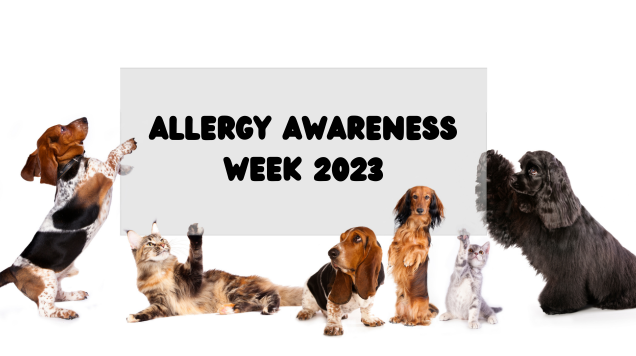Allergy Awareness Week

Did you know that 24th-30th April is Allergy Awareness Week in the UK?
According to Allergy UK, more than 20 million people suffer with allergies across the UK, ranging from environmental allergies such as pollen and dust, to food allergies such as nuts and fruit, and other allergies such as dog fur, bee stings and even certain medicines.
An allergy is the inappropriate response to a normally ‘harmless’ substance by the body’s immune system, which wrongly identifies the substance (allergen) as a danger. When an allergen enters the body, antibodies are triggered which release a chemical called histamine into the local tissue. Histamines cause swelling, inflammation, and itching which can be extremely uncomfortable and have serious implications. If histamines are released into the bloodstream, this can cause a life-threatening reaction called anaphylaxis, which requires immediate medical attention.
But of course, it’s not just humans that suffer from the nasty impact of allergies: dogs and cats can also have allergies, amongst many other animals. We can similarly categorise these into environmental, food, medicinal and other animals. Please remember, it is really important to identify and manage your pets’ allergies as soon as possible to prevent any discomfort and harm.
Environmental allergies
Dogs and cats can develop allergies to substances in their environment such as pollen, dust and mould. These tend to present in allergy symptoms such as coughing, sneezing, fatigue, lethargy, itching and sore paws/ ears/ muzzle/ underarms/ groin/ toes/ eyes. Make sure you consult your vet for available treatments and remedies for allergy relief, which may include medicine or topical products. There are some home remedies that can provide relief, such as oatmeal, coconut oil and aloe vera, but please check with your vet before trying anything new.
What should I look out for with environmental allergies?
Environmental allergies may be difficult to detect as we’re not always aware of allergens in our environment. There may also be instances where allergies develop over time, which may cause confusion over the allergy source. Environmental allergies tend to present in symptoms such as coughing, sneezing, fatigue, lethargy, itching and sore paws/ ears/ muzzle/ underarms/ groin/ toes/ eyes.
Medicinal allergies
Some medications can cause allergic reactions in dogs and cats, even when prescribed by your vet. In fact, medicinal allergic reactions are a very common cause of fatalities in pets. This could be because of incorrect dosage or certain ingredients, such as those found in flea treatments.
What should I look out for with medicinal allergies?
Medicinal allergies often present in immediate symptoms following the reception of the medicine in question. An allergic reaction to medication can present in anaphylactic shock (cold feet, collapse, extreme sleepiness, hyperventilation, muscle weakness, respiratory failure, weak pulse), diarrhoea, hives, intense scratching, licking and biting fur and skin, red rash anywhere on the body, runny nose, shaking head, sneezing and watery eyes.
If you notice any adverse side effects in your pets after starting a new medicine or drug, please consult your vet immediately.
Other animal allergies
Perhaps surprisingly, dogs and cats can also be allergic to other dogs and cats! The saliva, urine and dead skin of other animals can cause allergic reactions as they do for humans. Insect allergies can also occur following bites and stings from insects such as fleas and bees. Symptoms may include chronic itching, discomfort, sneezing and lethargy. Make sure you look out for signs of anaphylaxis following bites and stings from insects and seek veterinary advice immediately.
What should I look out for with animal allergies?
Allergic reactions to other animals can present in symptoms such as chronic itching, discomfort, sneezing and lethargy. Make sure you look out for signs of anaphylaxis following bites and stings from insects and seek veterinary advice immediately.
Food allergies
Dogs and cats can be allergic or intolerant to a wide range of food ingredients, both biologically appropriate and not. Food allergy symptoms can include paw and ear itching, and gastrointestinal symptoms such as diarrhoea and vomiting.
For cats, common food allergens include beef, fish, chicken, corn and dairy products. For dogs, common food allergens include proteins from dairy products, beef, lamb, chicken, chicken eggs, soy and gluten. Preservatives, additives, and artificial ingredients such as flavours and colours are also known to cause adverse effects for digestive and coat/skin health in both cats and dogs.
What should I look out for with food allergies?
f you dog or cat starts presenting symptoms after eating new foods such as itching, diarrhoea, vomiting, blood or mucus in stools, aversion to food, weight loss or fur loss, you should stop feeding the food in question immediately and consult your vet.
Elimination diets
Elimination diets are the best way to determine if your pet is allergic or intolerant to a certain food. This involves eliminating certain ingredients from your pet’s diet, and monitoring changes or reactions when foods are reintroduced. An easy way to carry out an elimination diet for your pet is to choose a single protein source to feed and settle your pet onto for the first week (we recommend Rabbit, Turkey, Duck or Lamb). Then, each week, reintroduce one new protein and monitor your pet’s reactions or symptoms. If any adverse reactions occur, then an allergy or intolerance is likely.
Once you have identified which food(s) your pet is allergic or intolerant to, you need to ensure that you choose food that is free from these ingredient(s). Remember - prevention is better than cure. Avoiding allergens in the first instance is always preferably to finding allergy relief for dogs and cats.
What is the best cat and dog food for allergies?
Dog and cat food which is free from preservatives, additives and filler ingredients is often recommended for pets with allergies. This is because these non-biologically appropriate ingredients can aggravate allergies and cause similar symptoms to allergies and intolerances themselves.
Nutriment’s raw pet food contains only high-quality ingredients from human-grade sources, and is free from fillers, preservatives, additives and artificial flavours/ colours. We have an extensive range of formulas and recipes, which means that you’ll have no problem finding a food that suits your pet’s allergy requirements. Nutriment’s Just range features single-source proteins to give you full control of your pet’s diet. Additionally, the Laverstoke Park Farm range of organic pet foods also gives you extra piece of mind if your pet suffers from allergies and intolerances (organically farmed foods are often easier to digest for allergy sufferers).
Explore our entire hypoallergenic portfolio for dogs and cats, and discover the extensive variety of options we have for you and your allergy-suffering pet.
As always, our in-house nutritionists are always available to discuss any allergy concerns you have regarding your pet’s diet. Feel free to get in touch!
Key terms:
|





